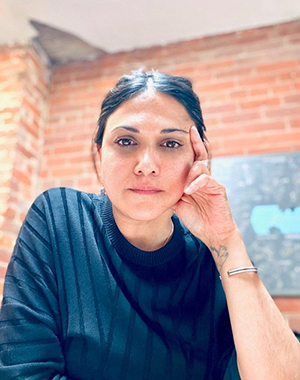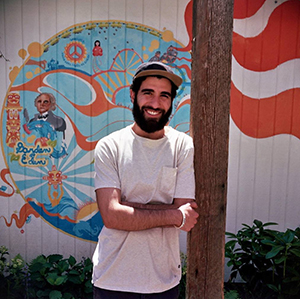What Remains of the Passage of Time:
Joey Mauro in Conversation with Mehr-Afarin Kohan

Volunteer Joey Mauro talks with Mehr-Afarin Kohan, whose story "North of the Ruins" appears in our spring issue #222. They discuss how storytelling keeps a culture alive, writing about the past as a way to find yourself, and the impact of the Iranian Revolution.
Mehr-Afarin Kohan is a Toronto-based writer whose fiction has appeared in The Missouri Review, The Citron Review, The Los Angeles Review, and The Antigonish Review, amongst others. Her flash fiction was selected for Best Small Fiction 2021. Born in Tehran, she immigrated to Canada as a teenager. She is a psychiatrist and psychoanalyst by profession.
Time operates as a set of layered memories in "North of the Ruins"—fragments of memories from the narrator's past life in Iran, from family members, and from Iran itself. What do memory, the passage of time, and the layering of the two help you to explore in the story? Does your background in psychoanalysis inform your exploration of memory?
I find what remains of the passage of time, and of our childhoods, are memories. Memories tarnished by time, by the new revisions and interpretations that our minds create of those memories. As every time a memory is remembered, it is also changed in the process. Psychoanalysis is also concerned with remembering the past—a process of uncovering and discovery. But it is less like an archeological excavation and more like feeling one’s way through a dark corridor, trying to make out the shapes by touching around them.
When we are disconnected from our place of origin, reconstruction of the past becomes even more contentious as we have less linkages available to us in the present time. Having left Tehran, Iran as a teenager about 25 years ago, I have recently been preoccupied (probably a function of turning forty!) with what remembering of a lost past looks like. “North of the Ruins” is one story in a series where I take myself to those hidden corridors of my mind, trying to reach sights, voices, smells of a childhood that feels so distant to me due to separations and alienations.
I find we cannot truly “reconstruct” our past and our past is never put together in a neat narrative, especially when displacement is involved. My memory is unreliable and since I have not been back to the places I am writing about in a long time (some of them are no longer there), I have no point of reference. In the end, all I have available to me are feelings and memory snapshots that form a sensory picture of a general sense of a past. So I am more interested in these micro-experiences, like smells and lights, and close-up shots of objects, spaces and people and that is what I am trying to do in this piece as well.
The narrator of "North of the Ruins" speaks from an undetermined future; however, the consistent present tense makes each memory read as if it were happening in real-time. As the narrator points out, "We see all of this as if it were taking place right now." This raises the question of when and from where the narrator speaks. Where do you suppose the narrator who left Iran is in their life at the point of telling this story and to whom might they be speaking?
The narrator of “North of the Ruins” is in a suspended space between past and future. The narrator telling the story in the present time is re-experiencing her past self, while the narrator in the story is also having a premonition about the future. It is similar to having a traumatic flashback or re-experiencing. It feels as if it is happening in the present time, however, the end is also already known (the person already knows the trauma that happened to them).
The question of whom the narrator might be speaking to is an interesting one. It is very much a reflective question for myself as well. Why am I writing this story? Who am I speaking to? Perhaps writing about the past is about finding oneself. But it is also about being seen and understood by others. I believe a lot of immigrant authors are preoccupied with having the experiences of their past life known to those in their new life. These lost linkages and divisions within undoubtedly come to trouble the writer one way or another.
Your story is also interested in the act of storytelling, with Grandmother's affinity for storytelling, and the fact that the narrator is telling us, the readers, a story. Can you speak to the relationship between storytelling and remembering? Do you think this reflexive theme of storytelling and remembering is something intrinsic to Diaspora fiction?
Storytelling is what keeps a culture alive and it takes on an even higher significance when displacement and disruptions are threatening the cohesion of a family or culture. The family in this story has experienced many displacements. The first is the broken link between the grandparents and their birthplace, as they moved from their village to the city. The grandmother is able to create a continuation between her past life and her grandchildren through the stories she tells them. Perhaps the narrator is now making a similar attempt as she tells the story of her childhood and her grandmother.
Another disruption within this family is the trauma that happened to the narrator's uncle. Once again, storytelling is creating a space for the trauma to be processed and for the lost family member to be commemorated and passed on to the new generation. As mentioned above, I believe storytelling is very important for Diaspora authors because it is in the act of storytelling that they keep the part of themselves with linkages to the past alive and in a way, bring the lost ones to life. We also see this in groups of people who have experienced collective trauma, such as Indigenous people and Holocaust survivors.
Is it through the revision process that you added the layers to your story, or did the story demand this complex structure from the start? Do you have any advice for writers who are struggling to reflect their content in their form?
Although this is not a “stream of consciousness” fiction, I used a similar method in writing the story. The original spark was inspired by a picture of razed buildings in the process of demise juxtaposed by new construction. My initial reaction was one of melancholia and through introspection, much like what happens on the analytic couch, I was able to trace my blues back to Tehran—the city of my childhood that I experienced as being in a state of sickly change due to the political oppression and corruption that has been leading the country to destruction under the current regime. And in the process, the layers were born almost spontaneously.
My advice for writers who are struggling to reflect their content in their form is to be curious about the process as much as they are dedicated to the content. They may find that content reveals itself when the form/process allows it. For example, in the past when writing about Iran, I felt burdened by trying to explain the political situation to the readers. As a result, I avoided writing about Iran for many years. But gradually I discovered that as long as I stick to the basic material of life and let it manifest in the form, I am appealing to universal human experiences, for example the melancholia of displacement or loss, that anyone can connect to without necessarily knowing the full context.
As Hemingway says, “No good book has even been written that has in it symbols arrived at beforehand and stuck in. That kind of symbol sticks out like raisins in raisin bread. Raisin bread is all right, but plain bread is better.”
The Iranian Revolution lingers in the background of "North of the Ruins." The narrator informs us that just to the south are the "razed buildings of Old Tehran with their damaged bricks and turquoise ceramics—the old parliament, the Shah’s palace, the wide streets once lined with cabarets and cafes." Why did you decide to set your story during this particular time? What drew you to writing fiction based around the Iranian Revolution?
Iranian identity is marked by the 1979 revolution that essentially transformed the state from a monarchy to an Islamic republic. Iranians as a nation come to understand themselves as before and after the revolution. This historical moment lives in the subconscious of every Iranian, although in many different forms and configurations. Revolutions lead to “upheavals,” not only within a society but also within every individual in that society. In the last forty years, Iranians have struggled with internal upheavals that make it difficult for them to situate themselves within their individual and collective identities.
I personally have struggled with this as an immigrant writer as I ask myself who my audience is, which translates into “who am I?” In fact, I do not have a lot of stories about Iran. It is only in the past couple of years that I decided to explore this part of my history and identity. I was born two years after the revolution into a family of political activists, persecuted by the Islamic government. So I do not believe that I can write about Iran without reflecting on how the revolution impacted my life.
In this story, I make an attempt to situate the narrator in the city she was born in, while also symbolically situating her in the history of her family and country. She stands in an intermediate space between a ruined past (south of her) and an uncertain grim future (in the north). She is struggling with many ruptures. Ruptures within her family of origin because of the movement from rural to urban, and ruptures in the history of her country because of the revolution, which she anticipates will ultimately lead to the complete destruction of her home.
What fiction are you reading right now?
Perhaps it is not a coincidence that these days I am reading Bruno Schulz’s The Street of Crocodiles. I find myself relating to this Jewish writer, who experienced the demise of his family, city and eventually himself. I am also immersed in short stories by Yannick Murphy. What I find interesting in her is the sensory aspects of her writing and the close-up shots of moments in life. She also comes from a family of immigrants, impacted by the sociopolitical situation of their country.

Joey Mauro
* * * * * * * *









